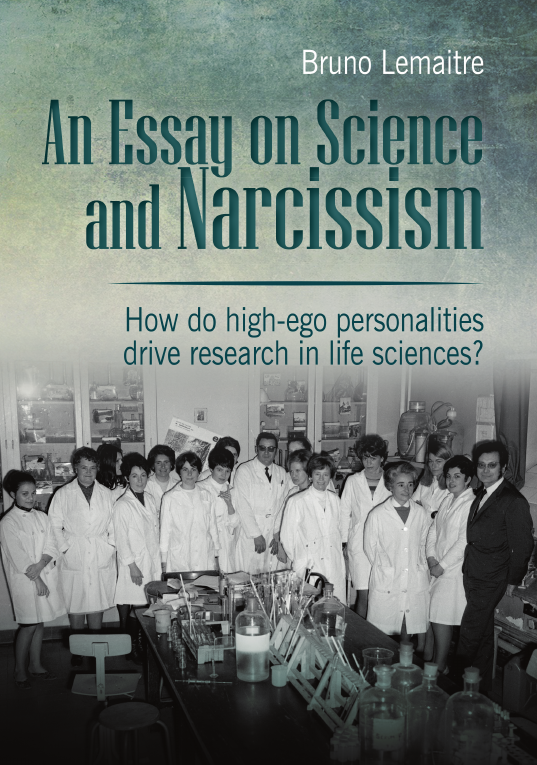 Dear colleagues and friends,
Dear colleagues and friends,
For many years now, I have been interested in how personalities tacitly shape interactions between scientists. While science is generally viewed as an objective activity, I have repeatedly been struck along my scientific career by how self-centered scientists with a big ego (i.e. high in narcissism) are often the most successful. Reading about social personalities and evolutionary psychology, I have tried to decipher how social dominance influences interactions between scientists within their community. This travel through emerging fields of psychology has been summarized in a book entitled “An Essay on Science and Narcissism: How do high-ego personalities drive research in life sciences?”. This book is an attempt to compile many implicit factors that are often the focus of informal discussion at meetings but rarely conceptualized. It also provides an overview of our knowledge of the narcissistic personality as well as insights into how the recent increase in narcissism in Western society, which is of great concern for its sustainability, could explain many ethical issues that have arisen in science. If you enjoyed it, do not hesitate to spread the information among people interested in personality and science!
For a short synthesis, see ” Science, narcissism and the quest for visibility“, The FEBS Journal March 2017. Open access
Click Here for Abstract
Scientists are often seen as meticulous and impartial individuals solely devoted to their study and the search for scientific truth. But a deeper analysis reveals that many of them are highly egocentric and sensitive to their public image and its associated privileges. Egocentrism, elitism, strategic media occupation and self-enhancement strategies are some of the first particularities that strike a newcomer to the academic world.
An Essay on Science and Narcissism analyses the influence of narcissism, an important human personality dimension, on science. The central idea is that narcissism is an advantageous trait for succeeding in an academic environment. Scientists with a high ego are better at convincing others of the importance of their research and, as excellent networkers, they are well placed to exploit the different facets of the research system. In his essay, Bruno Lemaitre also discusses the psychological and sociobiological origins of narcissism and investigates the possible connection between narcissism on one hand, and dominance and short-term mating strategy on the other. The recent increase in narcissism in Western society and how this destabilises not only our society but also scientific practice is also discussed. This essay offers an alternative view of science by analysing the narcissistic personality: prevalent among leading scientists, but rarely placed in the spotlight.
This book contains five illustrations done by Tom Reed. You can download the table of content here.
Click Here for Comments in the Press & Social Media
‘In his fascinating exploration, Bruno Lemaitre uncovers the complex face of narcissism in the world of science. This isn’t about science as most people think it happens, but the real – often personal and ego-laden – science. The science that people who aren’t insiders don’t see. This book will be an eye-opener for people on the outside of the scientific community, as well a treat for those interested in the positive and negative manifestations of narcissism in the scientific community.’
W. Keith Campbell, Department of Psychology, University of Georgia, Athens, USA
‘An immersion into the world of life science research, with an exquisite and sensible description of one fascinating character, the narcissistic scientist. Very instructive not only for people working in academia but also for those who want to understand the research world, and our society in general. Includes brilliant cartoons and text boxes, which convey clear and simple messages.’
Virginie Orgogozo, Research director, Institut Jacques Monod, Paris; France
The Gardian: article & podcast (January 2016)
Labtimes: Interview on the book (december 2016) Part 1: Defining the problem Part 2: Bad beahviours Part 3: Solution?
EPFL Magazine: Interview in French on the topic (epfl-magazine-03-2016-interview_v3) (November 2016)
The Scientist: “The Narcissistic Scientist: Are leading researchers driven more by the quest for knowledge or the pursuit of fame?” and an excerpt of the book (October 2016)
Le Monde: «Le système de recherche favorise les personnalités narcissiques»
EMBO Encounters: Narcissism in science: good or bad? (Book review September 2016)Bruno Lemaitre is professor at the Ecole Polytechnique Federale de Lausanne in Switzerland and he has been an EMBO Member since 2007. He recently published a book entiteld An Essay on Science and Narcissism: How do high-ego personalities drive research in life sciences?, in which he explores the link between narcissism and science, with a focus on life sciences. Lemaitre’s conclusion is that it is impossible to see narcissism as either good or bad. The trait is often useful for scientists and a certain dose of narcissism, maybe essential to becoming a scientist – and succeeding in an academic environment. Yet people with an overly strong narcissistic character negatively influence the community – in many different ways. “Unfortunately, the present system and science organization greatly favours narcissists, to the point that even bright people and hard workers may find the research environment too hostile,” Lemaitre writes. The author also discusses the origins of narcissism and its recent increase in Western society – with all the negative, destabilizing effects: “Narcissistic behavior becomes a serious threat as more and more individuals become increasingly self-centered.” James Briscoe, also an EMBO Member, recently commented on the book on Twitter: “Just read Lemaitre’s book on narcissism in science. Provocative, but depressingly familiar.”
Times Higher Education: “Is research a fertile hunting ground for narcissists?” by Matthew Reisz (August 4 2016)
Blog: “Labmosphere, a happy lab is a productive lab“(September 2016)
Blog “For better science” by of Leonid Schneider: “Bruno Lemaitre on Science and Narcissism“
How to find this book ?
The paper version of the book is print out. The pdf of the book is available for free at the Presses Polytechniques et Universitaires Romandes. Click here.
The book is also available on google book and research gate.